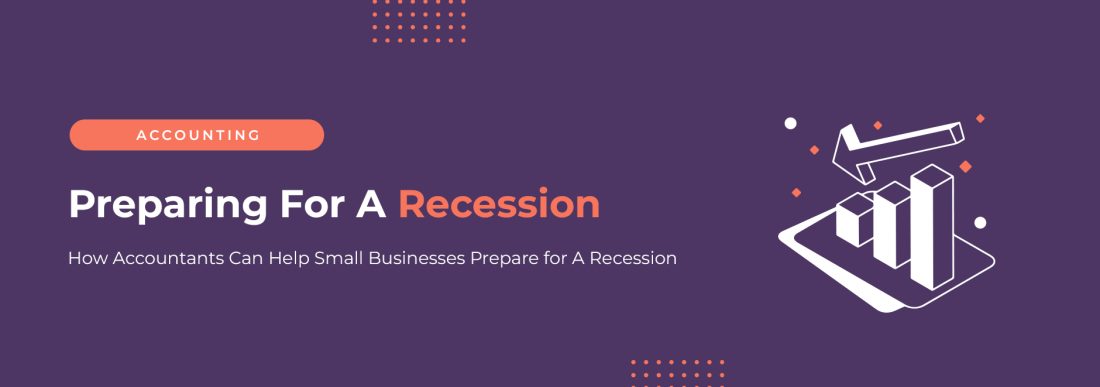How Accountants Can Help Small Businesses Prepare for a Recession
Mar 21, 2023 | 20 Min Read


Jump to Sections
Stay updated
with our Blogs
We will keep you updated about our latest blogs
Share This Blog
The media in recent times has been buzzing regarding the dreaded recessionary conversations. While recessions can be disastrous for most businesses, firms must be prepared to weather through the storm.
What is a Recession?
Impact of Recession on Small Businesses
Due to the various kinds of products offered by firms (categorized as luxurious and essential items), not all small businesses are affected equally in recessions. Essential products are relatively shielded from demand contractions than their luxury counterparts. Therefore, the extent of damage to each business is likely to differ. Below, we identify some of the major impacts of recessions on small businesses:
Demand Contraction: In recessions, household real income tends to be squeezed, owing to possible job layoffs or burgeoning inflation. These factors alter the consumption habits of consumers via curtailment of non-essential expenditures. For instance, in the case of B2B-centric businesses, small companies relying on a few large customers for their sales are likely to face challenges in case one of the client’s defaults or witness a steep reduction in demand. In both cases, a loss of revenue can be detrimental to small firm owners, as they would witness a drastic fall in income.
Reduced Cash Flow: The working capital cycle of a small business is normally quite tight as large pools of cash are not typically available to them. Prolonged cash cycles owing to delays in receivables may jeopardize the business altogether. Furthermore, businesses holding large quantities of inventory will see their cash flows tightly strapped as they may be unable to sell it at a pace quick enough to cover fixed costs and overhead or be forced to offer steep discounts.
Credit Crunch: Reduced cash flows mentioned above are also a result of the drying up of credit markets amid elevated risks in lending to small enterprises. With heightened uncertainty during recessions, default probabilities are higher and result in a rise in interest rates and stricter borrowing terms. In contrast to public limited companies, private businesses are unable to raise financing through the issuance of equity, corporate bonds, and commercial papers in the capital markets, which may increase the risk of default.
Loss of Staff: A credit crunch and low demand tend to result in the use of cost-cutting measures. The simplest method of doing so may unfortunately be through laying off staff. As a result, the remaining employees may be overburdened with work, decreasing any opportunities to generate additional revenue for the business. At the very least, a round of layoffs is a source of worry, concern, and angst for a staff body, prior to or post the round, regardless of which side of the terminated or still employed a given employee lands on.
Marketing Constraints: The domino effect of subdued demand and budgetary constraints due to the unavailability of financing is the curbing of marketing spending. A fall in marketing activities by most companies may also result in increased advertising rates, for the advertisement agency to compensate for the loss in revenues. This would make it more difficult for smaller businesses to resume their normal marketing needs in the future.
Although many entrepreneurs experience the negatives of recessions, a handful of businesses have flourished due to expert guidance and financial planning from their accountants, and supporting back-office teams.
How Accountants Can Help Prepare for a Recession
Small business accountants can prove to be worthwhile in building a strong foundation to prepare for economic downturns. Below, we discuss the many ways this can be done.
Cash Flow Analysis and Forecasting
Accountants can analyze the cash inflows and outflows of a business, while also providing useful insights into its effective management. They can provide both short and long-term cash flow forecasts. Accountants may also present plans to counter different business scenarios. They often provide an analysis of the best case, worst case, and most realistic case to ensure that the business owners always have a plan in place. The accountant may also suggest freeing up cash from the sale of idle assets to shore up the company’s cash balances, and other possible strategies that might not be readily apparent to an owner/operator or management team who don’t spend as much time in the financial source data.
Determine methods to increase profitability
An accountant for small businesses can undertake detailed assessments of the business’ operations to determine how profitability can be enhanced. They often suggest an analysis of individual segments of the business to ensure that only those providing positive contributions are operating. Reducing unprofitable sales may lead to a fall in market share and loss of customers but could result in a higher bottom line.
Debt Structure of the business
Careful forecasting of the cash flow position of the business may allow businesses to explore financing needs ahead of recessions. A small business could make use of credit lines beforehand to ensure they have sufficient cash balances to remain afloat. Accountants may also suggest debt restructuring prior to downturns to reduce cash constraints during the expected slowdown.
Accounts receivables analysis
Credit risk tends to elevate during economic downturns as the probability of debtor default increases. Accountants have expertise in scrutinizing the receivables of a business and can timely advise the management on potential corrective actions against clients unable to pay on time. An accountant for small businesses can recommend to the owners whether they should instead sell on cash, allow discounts for early payments, or ask for advance payments.
Want to learn about the next steps for growing your business ?
Planning and Risk Management During Recessions - Role of CPAs
Risk management is the effective management of threats and opportunities to businesses. Risk Management is conducted through a series of steps, which are the identification and analysis of risks, the selection of risk-mitigating measures, and the implementation and evaluation of appropriate strategies to minimize risk.
Provide Valuable Insight: Accountants are able to effectively depict the financial status of the company, as well as provide insights and solutions to business issues to the management. They conduct in-depth research on trends and business performance to guide the stakeholders in making better and more profitable decisions during difficult periods.
Cash Flow Analysis: With the help of a CPA, small businesses can divert their cash flow into vital business segments. Although cash is tight during a slowdown, CPAs can provide insights on measures to enhance the cash controls of the business. This may be through measures such as stricter credit controls to ensure the timely receipt of payments. For healthier businesses, CPAs can also offer a detailed analysis of investment opportunities available as in recessions, cash remains king, if not more so than during an economic boom period. It is important to understand that a profitable business does not necessarily mean that the company is liquid. Therefore, businesses must understand that when cash flows are restricted, it may be beneficial to let go of profitable activities and keep cash in hand.
Snapshot of Financial Position: By having an accountant, the owners of small enterprises can make use of accounting technologies that provide a real-time financial position of the business. Furthermore, CPAs can provide financial valuations of the business in case the owners desire to raise funds from potential investors or lenders.
Cost-Savings: The role of CPAs is vital in all phases of the business cycle. While businesses strive for profits, an accountant could also review the operations of the company and provide solutions to limiting expenditures. While competitors may be focused on reducing as many costs as possible, efficient planning processes provided by a CPA may allow some businesses to set aside cash for marketing, to ensure the capture of more market share. CPAs are trained professionals who can efficiently manage available capital, control expenses, and highlight measures to improve cash flows, among others.
The accountant may also advise on strategies to reduce employee travel expenses and establish alternative communication lines to achieve maximum productivity.
Identify Revenue-Drivers: While businesses may be struggling to generate revenue during a recession, accountants may pinpoint revenue-generating activities, while also advising on which activities are detrimental to success. CPAs can provide a framework of essential information that may be used throughout the downturn.
Assist during Downsizing: CPAs can provide strategies in case the owners consider downsizing. These can be through the understanding of the financial implications of shutting down locations, laying off employees, canceling contracts, discontinuing certain product lines, and much more.
Talk to lenders and suppliers: CPAs can assist in negotiating with lenders and suppliers. By having real-time data (using degrees of automation and the right software componentry) on the business’ finances, creditors would also be aware of any developments and may be willing to provide more capital when needed.
How Accountimize Can Help You prepare for a Recession
By outsourcing your accounting, reporting, and forecasting needs to Accountimize, not only will your business fulfill its reporting needs, but also gain valuable insights into business performance. The differentiating factor of working with us is our auxiliary focus on highlighting areas where the business is lacking while identifying measures for cost efficiencies.
We are experts in providing cash flow analysis and identifying revenue drivers of the business, especially in times of heightened uncertainty to counter any dismal performances of your firm during challenging times.
So, place a call with one of our team members to prepare your business for recessions in the future.
Book a Discovery call


Stay updated
with our Blogs
We will keep you updated about our latest blogs



